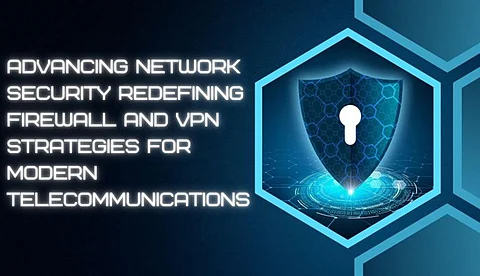

With the ever-changing dynamics of the digital world, ensuring telecommunications infrastructure becomes increasingly important. The research paper by Siva Prasad Ponnuru's explores innovative solutions in strengthening network security using advanced firewall and VPN strategies. The main theme includes the integration of emerging technologies to ensure fighting cyber threats, boosting scalability, and ensuring seamless operations in the ever-changing cybersecurity environment. These innovations equip organizations with the toolsets required for complex and dynamic security challenges.
Firewalls have evolved substantially in order to meet the needs of the modern telecommunications network. Next-generation firewalls, NGFWs, are instead of traditional firewalls and have machine learning and artificial intelligence. Analysis of 7.5 million packets per second is accomplished with a threat detection record of 99.47%. The capabilities that include deep packet inspection, application-layer filtering, and traffic segmentation can satisfactorily neutralize threats. Such firewalls will thereby assure high performances in performance while holding strong defensive cyberattacks besides remaining in compliant state with continually emerging security measures.
Virtual Private Network has had such developments which integrate the Advanced encryption protocols called ChaCha20-Poly1305, offering efficient and secure transfer of data. The recent advanced enterprise Virtual private network currently accommodates more concurrent connections in it at least up to 15,000 simultaneous connections accompanied with reduced latencies and a strengthened reliability measure. VPNs have reduced latency by 43% while keeping security integrity in place through the inclusion of split tunneling, zero-trust architectures, and adaptive bandwidth allocation. These advancements guarantee easy connectivity between remote and hybrid workforces; it keeps sensitive information from falling into vulnerabilities and ensures productivity on the part of the users.
The zero-trust model is one of the pillars of modern network security. Implicit trust has been removed, and strict identity verification is enforced at every access point. This helps in securing systems by constantly validating users and devices trying to gain access to resources. Integrating firewalls and VPNs into a zero-trust framework brings organizations 76% fewer attempts at unauthorized access and a 50% better efficiency in detecting threats. Zero trust is also providing an appropriate secure distant work environment as the trusted attack surface which was added by hybrid and distributed work model.
Automation and artificial intelligence have become the crux in modern cybersecurity strategies. AI-powered firewalls and VPNs make threat detection much more efficient with a chance of fewer false positives and much less incident response time. Automated rule management systems simplify firewall configurations, thereby decreasing errors by 96%, downtime, and acceleration of deployment. These developments allow businesses to be always ahead of emerging threats, allocate resources better, and enhance the efficiency of their operations. Using AI, security systems adapt over time to the changing nature of sophisticated and unforeseen threats.
The threat landscape continues to change as attackers use new forms like APTs, zero-day exploits, and complex social engineering attacks. Modern security solutions that can look out for such threats by real-time threat intelligence as well as advanced monitoring techniques include fully integrated firewalls with machine learning algorithms and monitor behavioral patterns looking out for anomalies. VPNs then present robust encryption layers for sensitive data as protection. Adaptive security measures therefore greatly mitigate risks, enhance resilience, and ensure organizations are always protected against increasingly complex and targeted cyberattacks.
Maintaining an optimal performance-security tradeoff is considered one of the greatest challenges in network security. High-performance firewalls with hardware-accelerated processing units reach a sustained throughput of 1.2 Tbps, thereby reducing bottlenecks during peak periods and supporting global operations. Similarly, contemporary VPNs ensure that connectivity remains uninterrupted with 99.999% uptime to ensure that the organizations can provide reliable and secure communication pathways. Optimizing encryption algorithms, overhead reduction, and use of scalable architecture allow organizations to gain strong security measures without compromising network speed or efficiency.
This new era of complex cyber threats implies the adoption of advanced technologies: quantum-resistant cryptography, blockchain solutions, and edge computing. This is a source of new innovative solutions that would help to cope with the growing problems and allow scalability, efficiency, and a holistic approach toward protection. By adopting such frameworks, investing in the most progressive solutions, and promoting cross-industry cooperation, organizations will create robust infrastructures capable of dealing with the digital complexity of their times. This way, they are long-term ready for security readiness and innovation.
In summary, advanced firewall and VPN strategies by Siva Prasad Ponnuru's underscore the new changes that the modern technologies of today are introducing into the sphere of telecommunications. It helps an organization prevent the future threats posed by new technologies integrated into the holistic security structure that still can offer scalability and performance. It forms a reference framework in which to apply the solid, efficient, and future-proof security solution in an increasingly connected world.
